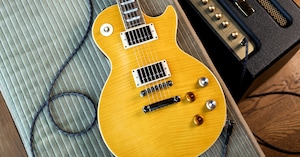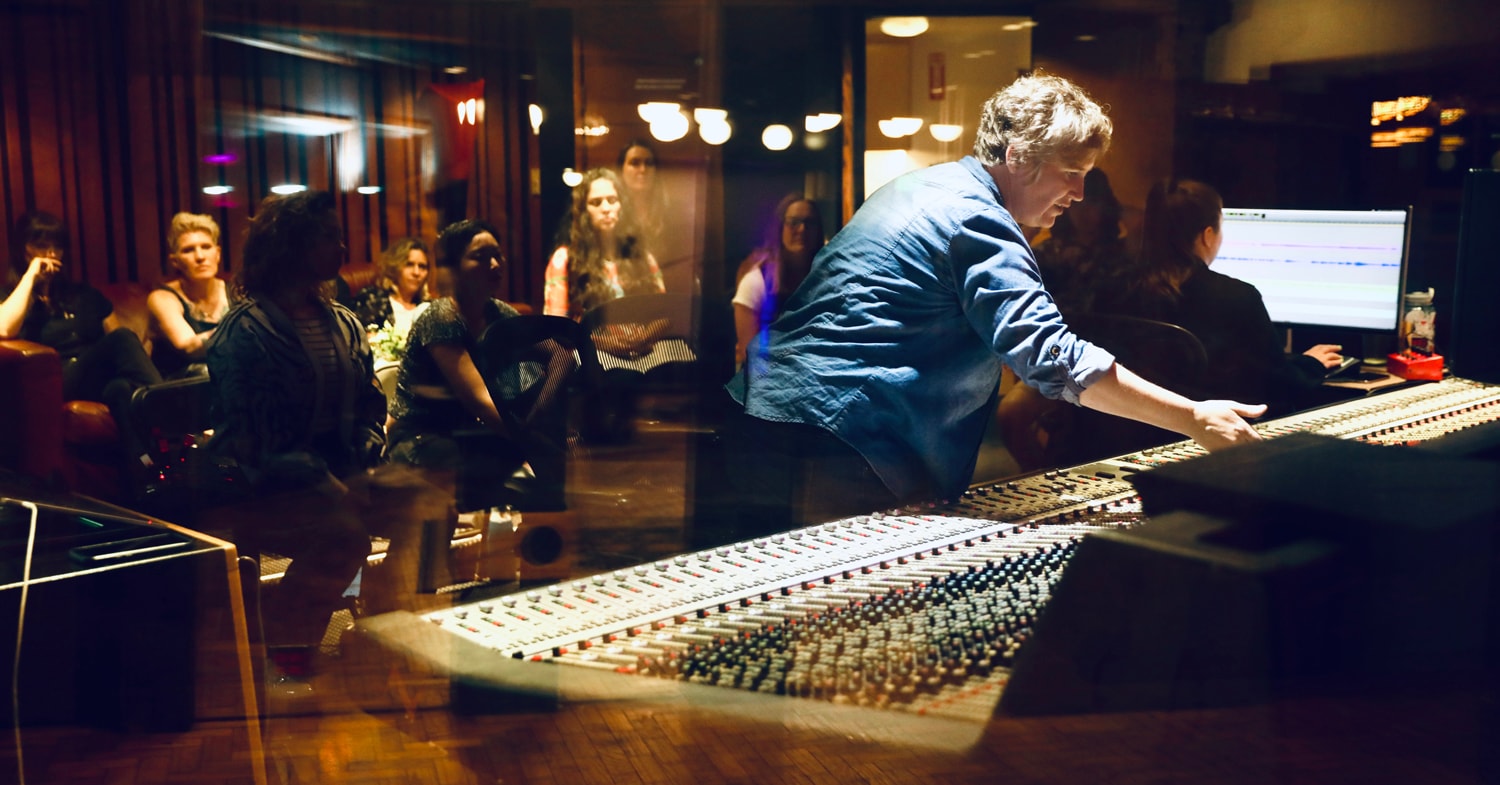By Jenn Pelly
Pop history is filled with women legends of music production, from Joni Mitchell's self-produced folk-jazz hybrids to Sylvia Robinson's pioneering hip-hop classic to the futurecasting work of Kate Bush, Missy Elliot, Björk, SOPHIE---the list goes on and on. But year after year, one of the music industry's most jarring realities is how few women producers and engineers are represented on the pop charts. A recent study by USC Annenberg's Inclusion Initiative reported that in 2023, the Billboard Hot 100 contained the highest-ever percentage of female production credits, at only 6.5%. In the past nine years, only 3.2% of production credits were attributed to women. To date, no woman has ever been awarded the Grammy for Producer of the Year, Non-Classical.
The nonprofit She Is the Music launched in 2018 to help change that. Founded by Alicia Keys and members of her team, and fueled by the Annenberg Inclusion Initiative’s research on gender disparity in music, She Is the Music is actively investing in a future where women are equally represented in not only production and engineering but songwriting and every other facet of the industry. The volunteer-powered organization hosts all-woman songwriting camps around the world, facilitates a robust mentorship program, and maintains the largest existing global database of women working in music. “When we hear, ‘Oh, we don’t have any women’ or ‘I can’t find a woman to work with,’ it’s such an archaic excuse,” says executive director Michelle Arkuski. She Is the Music is helping banish that antiquated logic, and fostering a music world where there are no limits on the roles women can imagine themselves filling. We spoke with Arkuski about She Is the Music’s origins, the “dismal” statistics and recent strides powering the organization’s work, and its ongoing mission to create a more equitable future for music.
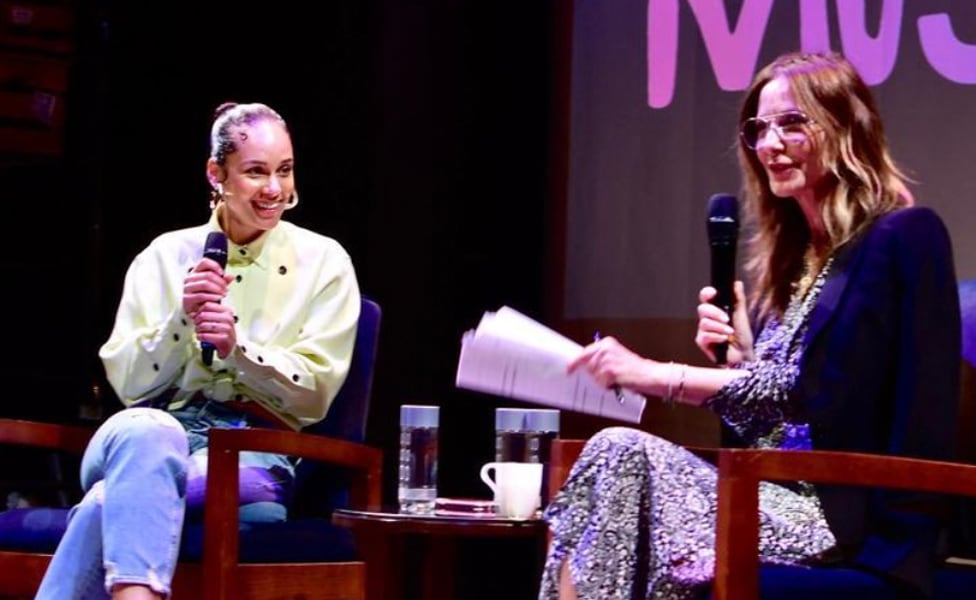
Pictured: Alicia Keys (Left), Jody Gerson (Right)
Why was the moment right for She Is the Music to launch in 2018?
Arkuski: It was the first time a study had been done directly looking at women in the music industry—and that was from the USC Annenberg Inclusion Initiative, which has since done a new report every year. There was finally visibility to these statistics. Once those numbers were out at the forefront, everybody was in shock—and not just shock, but really wanting to create a change and bring more awareness to this issue. So Alicia Keys, Jody Gerson, Ann Mincieli, Sam Kirby Yoh—they were brainstorming and asking, “What can we do to make an impact? What can we do to change this?” Today we have the same mission to increase the number of women working in music—songwriters, artists, executives, creatives, producers, engineers, anything in between.
How did that group of women who founded the organization first come together?
It was and is Alicia’s camp for the most part. Jody Gerson has been Alicia Keys’ publisher forever. Ann Mincieli is Alicia Keys’ longtime engineer of 15-plus years. And Sam Kirby Yoh was her agent. I think there was a bit of a ripple and domino effect within them, having these conversations: “Did you see these numbers? Can you believe it? Isn’t this insane? What can we do ourselves to make it better?”
With the music industry being so male-dominated at every corner, it’s interesting to know that Alicia Keys was already working closely with so many women even before founding this organization. Has that been a priority for her throughout her career, to work with other women?
I can’t speak [for her], but her ethos is definitely always to uplift women and women of color and marginalized groups. I think having a female engineer of 15-plus years is a pretty good indicator of going against the norm and really uplifting another woman. I know she mentored songwriters and different up-and-`coming artists as well.
She was a teenager when she got into this business, and I know she had uncomfortable situations in a studio. I think people forget that when you’re in a recording studio, there’s no HR, there’s nobody that you can go to. You’re most likely working late hours and you will most likely be the only woman in the room. And that alone is a system that hasn’t really changed. Even today, you can have a bad experience with a guy in his studio who makes you feel uncomfortable and there are no repercussions. Most likely he won’t work with you, or you won’t work with him, and that’s the end of it.
Those sorts of experiences can really discourage people from pursuing careers in music, too. Can you tell me more about the partnership between USC Annenberg’s Inclusion Initiative and She Is The Music?
The Annenberg Inclusion Initiative has been around since 2005, and it has examined the portrayal of women in entertainment as a whole; it’s not exclusive to just music. However, the 2018 study was the first on women in music. When that came out, across the industry people wanted to learn more and connect with Dr. Stacy L. Smith, who led this study and continues to lead the charge. So I think that alliance was founded because of the want for more information. Stacy was able to provide the research for a group of women in the industry who wanted to change those statistics. It was very collaborative and open-ended from the beginning. Dr. Stacy Smith now sits on our board as a founding member and an executive committee member who we entrust and respect entirely.
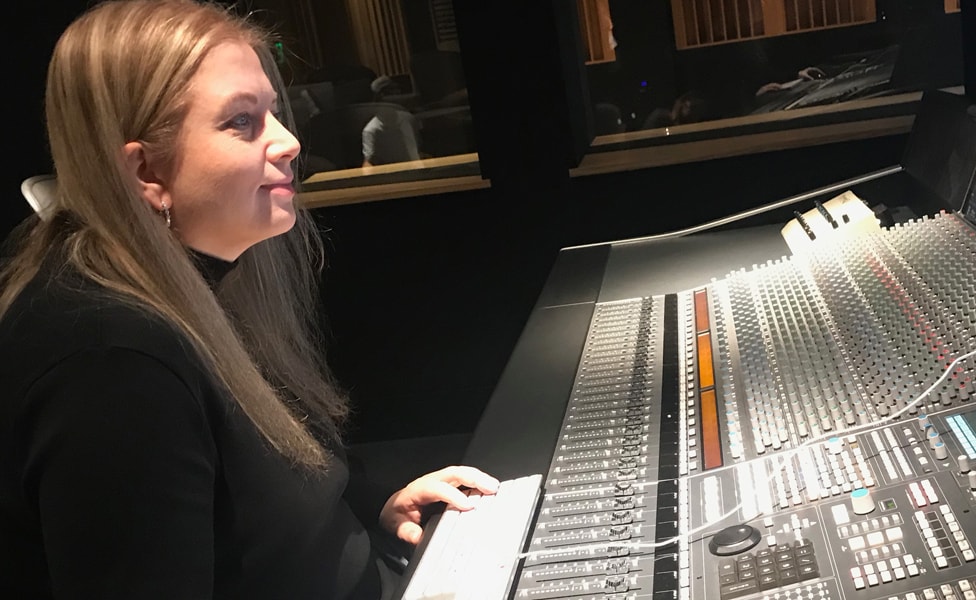
Pictured: Ann Mincieli at the recording console
Why do you think women have been so egregiously shut out from producer and engineering roles historically?
That’s such a great question. At its core, production and engineering is a STEM role, and outside of music, we already know that there is gender disparity in science, technology, engineering, and math roles. So I think when women come to the forefront of learning those skills, it can be moderately unwelcoming if maybe you’re the only woman in the studio or in an engineering classroom—you’re already at a disadvantage by the lack of representation to begin with. So I don’t know if it’s necessarily women being shut out as much as it’s just a trickier barrier to entry to feel secure going into a heavily male dominated room for 10 hours a day and learning the board and not feeling like an outsider.
That being said, when we talk about progress, we are seeing so many women being able to learn to produce and engineer on their own, whether that be in their bedrooms, at their own home studio, or taking classes. I think we’re really starting to make progress in terms of women taking initiative to educate themselves and wanting to be able to produce and engineer. It’s exciting.
We actually just wrapped a weekend-long program where we sent and paid for flights and lodging for 20 female engineers to get Dolby Atmos certified in partnership with Derek Ali's EngineEars program. And it was amazing. Those women ranged from wanting to work as regular music engineers to being artists themselves and just wanting to get more education and more perspective. But we facilitated an environment of all women, which I think was probably something most of them have never gotten to experience before.
She Is the Music has also hosted all-women songwriting camps around the world, in the U.S., UK, China, Ghana, and beyond. What do you think comes out in an all-women creative environment that wouldn’t come out otherwise?
We’ve done over 20 globally, and the feedback that we are constantly getting is, “I have never been in a studio with another woman, let alone four or five other women, in my life.” I think there’s a comfortability to the all-women sessions, or an openness it creates. Everyone is able to create what they want and share what they want without any barriers or fears, just knowing that you’re in a safe place with other women.
In those sessions, what kinds of music are people working on?
That just depends on the camp and the project. Sometimes we’ll have an artist project tied to it. Sometimes it’s genre specific. Sometimes it’s for a sync project. For example, we did a songwriting camp in partnership with Alicia Keys and Mercedes-Benz. The women that came to that camp knew they would be writing for a song that would be tailored to a Mercedes-Benz and Alicia project, with a very specific end goal. Or we did a Riot Games camp, where they gave us parameters for music they were looking to have songs written for. And we’ve had other camps where people come in with their own style and it’s open-ended.
How have you seen the impact of the mentorship program play out in the world?
We’ve placed 30 women in their first jobs and internships from just four years of having our mentorship program. We typically take 30 women each summer and place them with 30 women across whatever category they’re most interested in, from production and engineering to digital marketing to video and art direction. I’m seeing the direct result of those relationships with mentees and mentors blossom into something that goes beyond that eight-week program. I’m also seeing them come out into the world with jobs, better knowledge, better education, or having us as a resource for their futures. It’s honestly really inspiring.
We really want to make sure that we’re not just focusing on college students, too. Maybe you’re working at a label and looking to transition and need a guide. Or maybe you’re not in college and you’re living in Arkansas where there’s no music industry—you can apply, too. We want to help those that don’t necessarily have the access as well.
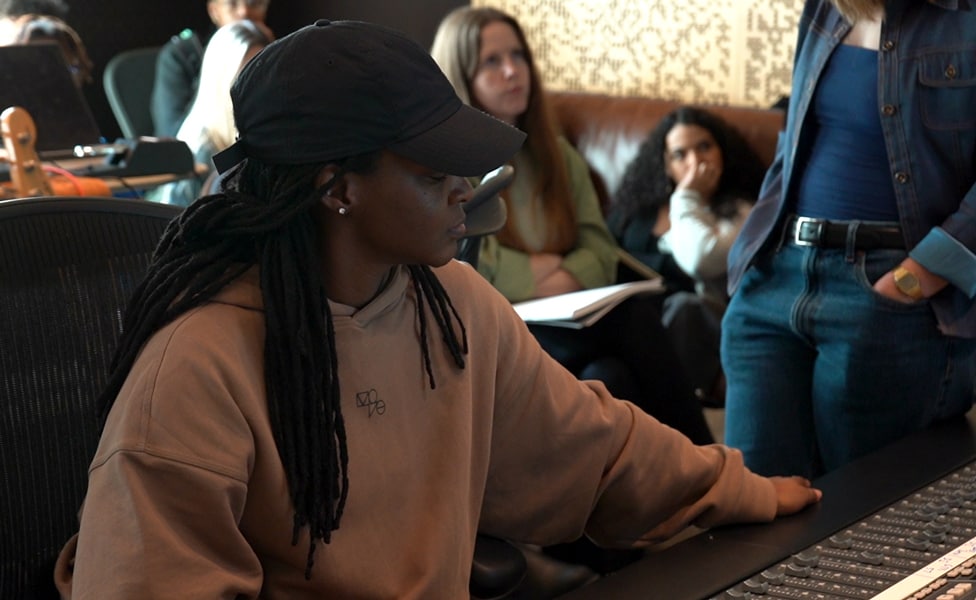
Pictured: She Is the Music Team in the studio
Do you think ageism affects women in music more than it does men?
I can’t draw on any statistics behind that, but in terms of my instinct and gut—absolutely. I think it’s why we’re so mindful, even with our mentorship programs, to reiterate that it’s not just for college women or students. It’s really for all women in various stages of their careers. We want to avoid any type of ageism that may exist, and I think it definitely does. And how can we be a small part to make sure that it’s not?
To go back to the lack of representation among producers and engineers—are there any women you feel are breaking ground right now in producer and engineering roles?
Look at Ann Mincieli, who’s Alicia’s engineer of 15 plus years. She just won a Grammy for Best Immersive Sound. I think of Marcella “Ms. Lago” Araica, who has worked with Madonna, with Britney Spears—these are women who have decades in production and engineering, who are absolutely killing it. Suzy Shinn is an unstoppable force that everybody wants to work with. It’s hard for me to want to single anyone out because there are so many—sorry, there aren't so many, but the women who are making strides are killing it, and there’s not just like three or four, right? They’re really starting to break barriers.
How do you see She Is The Music’s mission expanding in the future?
We’re looking to continue growing our programming so that we have an even greater reach and be a resource for more women. To date we’ve provided eight scholarships for women who want to attend Blackbird Academy in Nashville to get certified in engineering, and if we can continue to multiply that number and keep facilitating the work we're already doing to a bigger scale, that to me would be success.
We continue to hold networking panels and informational sessions all over the U.S. The organization is pretty much run by volunteers, except for myself, and we have committees regionally in L.A., San Francisco, Chicago, Miami, New York, Atlanta and a couple of others. It’s really an open-door organization, and I encourage anyone who has an idea to email me at Michelle@sheisthemusic.org. There’s no exclusivity. It’s all very open and fluid.
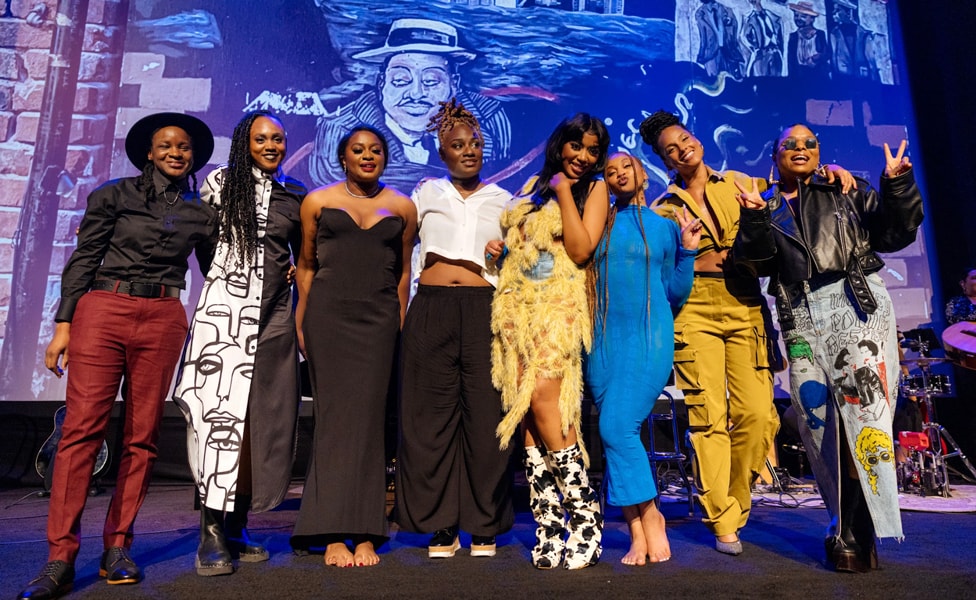
Pictured: She Is the Music Team at the Tribeca Film Festival
How else can we make studios and mixing rooms more hospitable to women-identifying music workers?
If you’re in the position to hire, consider hiring a woman, whether you’re in the studio or an office. If you’re an artist, consider listening to a female songwriter or a female producer. Make sure you’re giving women a seat at the table. Ask, “Is there a woman who’s good for this?” And make sure that you’re asking that question while also implementing an equal level of respect. Respect is a really broad term, but it’s really indicative of what it means to be in a safe place.
Jenn Pelly is a freelance music writer and the author of "The Raincoats."
